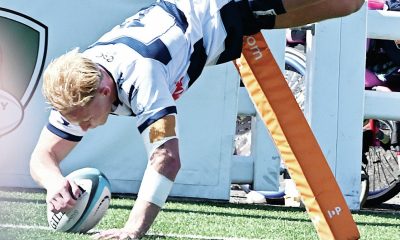 I must admit to some surprise at the reaction to Graham Henry’s claim in his autobiography, that he wondered if Wayne Barnes and his assistants were effectively ‘got at’ rather than just being inept, as in his opinion their impartiality was questionable during the 2007 World Cup.
I must admit to some surprise at the reaction to Graham Henry’s claim in his autobiography, that he wondered if Wayne Barnes and his assistants were effectively ‘got at’ rather than just being inept, as in his opinion their impartiality was questionable during the 2007 World Cup.
In almost every World Cup since its inception, there have been many accusations levelled at the officials in charge by those that watch and comment on the game, particularly the finals.
In 1987 all the Northern Hemisphere countries felt that there was a bias towards the Southern Hemisphere in the way that games were refereed by their SANZA countrymen.
Keith Lawrence awarding a try for David Campese against England – despite the ball being knocked from his hands by a great tackle from England fly-half Peter Williams before the ball was grounded. Also the performance of Australian Kerry Fitzgerald (personally one of my favourite refs) in the final, encouraged some to feel there had been an unspoken pact that a SANZA country had to win the inaugural competition no matter what.
The 1991 final I played in was lost by the failure of referee Derek Bevan to award a penalty try for a deliberate knock on by David Campese that stopped a certain try. Had he given that instead of just a kick at goal, it would have levelled the match and sent it into extra time at a point where we were in the ascendancy.
We English have always thought it was just the fact that a Welshman could not live with the thought that he had effectively given an England team the World Cup.
The 1995 WRC was the only year without a referee scandal, but there were still mutterings of officials poisoning the New Zealanders to guarantee a South African win.
The 1999 WRC saw the remarkable second half comeback by France to beat New Zealand 43-31 in the semi-final in a game refereed by Jim Fleming.
There were comments at the time that Fleming had changed his game at half time which led to the All Blacks demise, but for those of us who had played under Jim before, we knew that this was his usual style of game management.
The final in 2003 – South Africa ref Andre Watson. Need I say more, and that’s despite the fact that England won.
The year that Henry has complained about is 2007 and that brings us, at last, to 2011 where referees Alain Rolland became the most hated man in Wales and Craig Joubert the most loved (second to Richie McCaw) in New Zealand.
Rolland, for being the only referee brave enough to make the right decision to send off a player for tip-tackling and Joubert for not penalising New Zealand in kickable range towards the end of a game that France could easily have won.
In all these and many more games you could question the impartiality of the referee and whether or not they have been ‘got at’ in some way or other, and in these days of growing online gambling with spread betting on points difference as well as the final scores, it is right that Henry or any other person asks the question: Does the IRB have any system in place to review what in some people’s view are suspect games?
If they do not then they must act to make sure that our game doesn’t fall into the same sort of match fixing scandal that has rocked cricket over the last few years.
As a player that played in some of the games I mentioned I have to say that I don’t believe that any of the referees in those games were involved in skullduggery.
International rugby has always been a fast and furious sport with bodies flying everywhere, and in such a heated environment it is easy to make a mistake and miss certain things or just react a little too slowly both as a player and a referee which brings me back to why Kerry Fitzgerald was one of my favourite referees.
In 1990 England toured Argentina. We were the first national team after the Falkland’s war so you can imagine that all the games were torrid affairs and certainly not for the faint hearted!
The Test matches were even more intense with both sides not asking or giving any quarter.
We won the first Test 25-12 which put the Argentine players under more pressure to get a result in the second Test and made that game far more physical.
I have always believed that there are three levels of violence in rugby and they are defined like this: Level 1 you are hit but it doesn’t hurt or affect you in any way so you just shrug it off, Level 2 you’re hit and it hurts so you think I’ll get him back later when the opportunity arises and finally Level 3, where a player does something that could cause a serious injury so he must be dealt with at the first opportunity to stop him doing it again.
In that second Test, as the first scrum was breaking up, their second row kicked me in the face while we as a front row were still bound. Obviously I was not happy as this was (in my mind) a Level 3 assault, but unfortunately the referee on the day, Kerry Fitzgerald, didn’t see it as he had followed the ball.
My first opportunity to make sure their second row wouldn’t do it again, came at the next scrum where I dummied to engage and, as they came forward, I returned the compliment and kicked him as hard as I could in the face, not something I am proud of – but I thought it was necessary to protect myself from any further attacks.
As it was directly in front of Fitzgerald he immediately blew his whistle and with their second row lying bleeding on the floor he called me to the middle of the pitch.
What I had done was a sending off offence and I knew it but Kerry knew that something had happened at that first scrum despite the fact he had missed it.
He said, “I knew you’d get him back but I thought you’d wait. It’s going to be a penalty.”
Sadly that penalty cost us the game – but at least I wasn’t badly injured.

1 Comment
You must be logged in to post a comment Login
Leave a Reply
Cancel reply
Leave a Reply
You must be logged in to post a comment.

British and Irish Lions
British and Irish Lions: Biggest winners and losers from Andy Farrell’s selection

British and Irish Lions
Henry Pollock’s rise to stardom continues with 2025 British and Irish Lions selection
























Pingback: ที่พักเชียงคาน